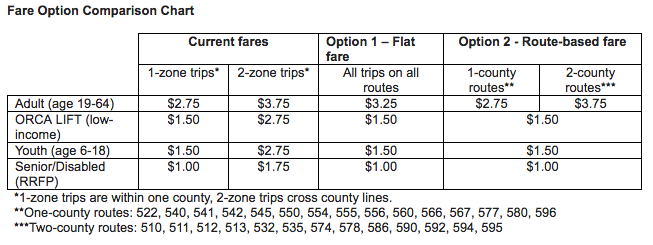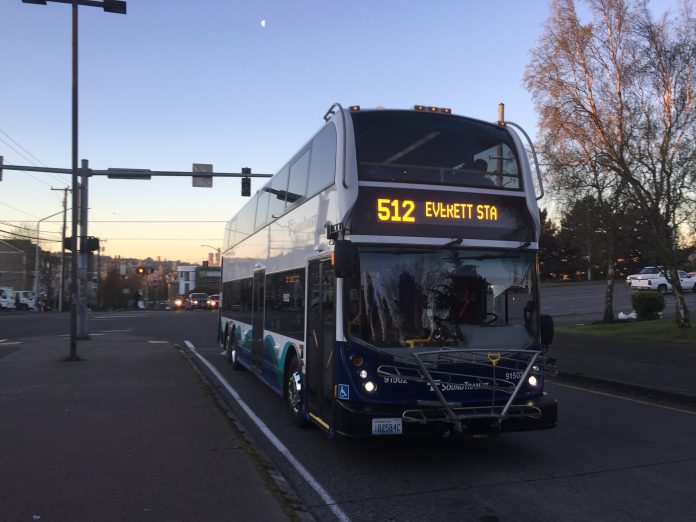Sound Transit is considering two fare simplification options for ST Express bus routes. The fare simplification effort is partially related to regional implementation of the next generation of the ORCA fare system due out in 2021. Sound Transit operates more than two dozen express routes regionally. Some of these routes run across two counties (e.g., ST 512 and ST 590) while others only operate within county (e.g., ST 542 and ST 550). The current fare structure includes differing fares based upon whether a rider crosses a county line or completes a trip fully within one county.
Routes like ST 550 are completely within one county and therefore rides are charge a one-zone fare. Others like ST 512 could include one- or two-zone fares depending upon if a rider will cross the King/Snohomish county line on their journey. Sound Transit wants to simplify this by either adopting a flat fare for adults on all ST Express routes or charging fares by whether a route operates wholly within one county or operates across county lines. Both options would reduce fares for ORCA LIFT (a low-income program) and youth passholders to $1.50 regardless of distance or route type. Fares would also be simplified to $1.00 for senior and disabled residents with an RRFP pass.

The flat fare option would dramatically subsidize long-distance routes, which often cost more to run than one-county routes. That option would most benefit suburban commuters, but could help alleviate some of the financial pain for those with lower incomes. One-county riders, however, would see an 18% fare increase overnight.
The route-based fare approach would be closer to the status quo, but could discourage many one-county riders to reconsider using two-county express routes due to much higher fares. Using ST 512 as an example, many riders shuttle between Downtown Seattle and North Seattle/Shoreline even though the bus operates as far as Everett. Likewise, many riders in Snohomish County only ride the route between Everett and Lynnwood. A 36% fare hike for the same service is simply unjustifiable.
Ultimately, this proposal suffers from many of the same pitfalls of Metro’s recent structural changes to fares. A better option would simply be to reduce all adult fares to $2.75 and increase the income eligibility for ORCA LIFT to result in the most equitable outcomes. Indeed, Sound Transit would initially incur lower farebox recovery, but it wouldn’t push riders away from using transit and likely increase equity objectives. Farebox recovery is simply a metric, not a policy that should be prioritized over equity and ridership.
A public hearing on the proposal will happen on Thursday, February 1st at Union Station in Seattle. The meeting will be held in the Ruth Fisher Boardroom at noon. Comments can be submitted online through February 11th. Fare changes could be implemented by July, if approved by the Sound Transit Board of Directors.
Stephen is a professional urban planner in Puget Sound with a passion for sustainable, livable, and diverse cities. He is especially interested in how policies, regulations, and programs can promote positive outcomes for communities. With stints in great cities like Bellingham and Cork, Stephen currently lives in Seattle. He primarily covers land use and transportation issues and has been with The Urbanist since 2014.



